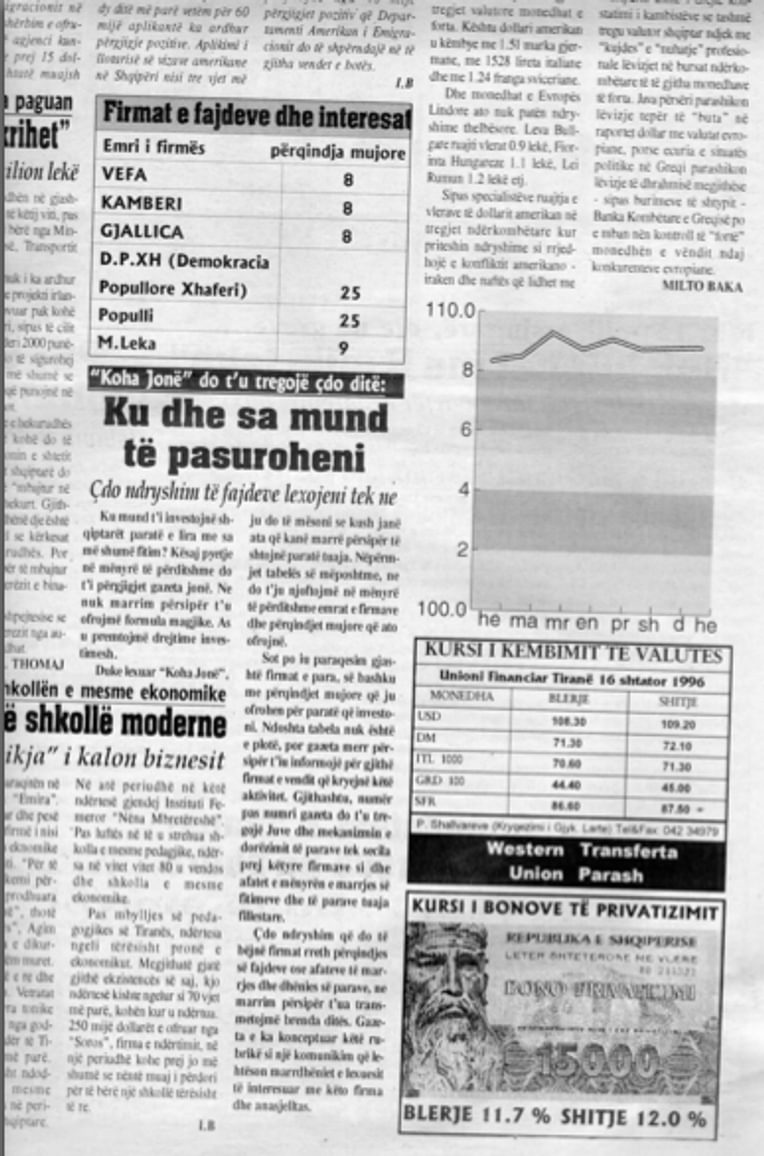This post builds on the research article “Tales From Albarado: The Materiality of Pyramid Schemes in Postsocialist Albania,” which was published in the February 2011 issue of the Society’s peer-reviewed journal, Cultural Anthropology.
Editorial Footnotes
Cultural Anthropology has published a number of essays on post-socialism, including Dominic Boyer and Alexei Yurchak "American Stiob: What Late-Socialist Aesthetics of Parody Reveal about Contemporary Political Culture in the West" (2010), Nancy Ries' "Potato Ontology: Surviving Postsocialism in Russia" (2009), and Paul Manning's "Rose-Colored Glasses? Color Revolutions and Cartoon Chaos in Postsocialist Georgia" (2007).
Cultural Anthropology has also published essays on investment. See for example, Julie Livingson's "Suicide, Risk, and Investment in the Heart of the African Miracle" (2009), Peter S. Cahn's "Consuming Class: Multilevel Marketers in Neoliberal Mexico" (2008), and Karen Ho's "Situating Global Capitalism: A View from Wall Street Investment Banks" (2005).
Multimedia


The newspaper announces that, alongside the daily monetary exchange rate and the exchange rate of letra me vlere (privatization bonds), it will now regularly display the interest rates of the different kompani and fondacione. Koha Jone describes them as firma te fajdeve (money-lending firms), after their collapse these were all considered as pyramid schemes. The headline of the accouncement (typed in bold) says "Koha Jone will tell you everyday: Where and How Much to Get Richer".


The company advertises its motley collection of values at its five-year anniversary: "incarnation of humane capitalism; valuing national priorities; confirmation of stability and broad perspective; direct investment and rapid circulation of money; dynamism and intuition; contemporary tendency in the area of application of technology; accurate planning and economic pragmatism" diverse portfolio of activities including "air, land, water transportation; tourism and urban construction; light and food industry; agriculture; culture and marketing".


Related Readings
Bezemer, Dirk (2001) Post-Socialist Financial Fragility: The Case of Albania. Cambridge Journal of Economics 25(1):1–23.
Comaroff, Jean, and John Comaroff. (2000) Millennial Capitalism: First Thoughts on a Second Coming. Theme Issue, “Millennial Capitalism and the Culture of Neoliberalism,” Public Culture 12(2):291–343.
Guyer, Jane (2004) Marginal Gains: Monetary Transactions in Atlantic Africa. Chicago: University of Chicago Press.
Harvey, David (1989) The Condition of Postmodernity. Oxford: Blackwell
Jarvis, Christopher (1999) The Rise and Fall of the Pyramid Schemes in Albania. IMF Working Paper, 99/98. Washington, DC: IMF.http://www.imf.org/external/pubs/ft/wp/1999/wp9998.pdf
Latour, Bruno (2005) Reassembling the Social: An Introduction to Actor-Network Theory. New York: Oxford University Press.
Roitman, Janet (2005) Fiscal Disobedience: An Anthropology of Economic Regulation in Central Africa. Princeton: Princeton University Press.
Tsing, Anna Lowenhaupt (2000) Inside the Economy of Appearances. Public Culture12(2):115–144.
Verdery, Katherine (1996) What Was Socialism and What Comes Next? Princeton: Princeton University Press.
Yurchak, Alexei (2002) Entrepreneurial Governmentality in Post-Socialist Russia: A Cultural Investigation of Business Practices. In The New Entrepreneurs of Europe and Asia. Victoria Bonell and Thomas Gold, eds. Pp. 278-324. Armonk, NY: M. E. Sharpe.